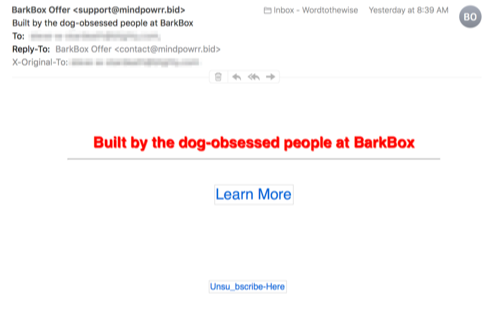The Problem With Affiliates
If I see BarkBox I think Spam.
That’s because, despite their marketing team effort, facebook and banner ad budget, the main place I see them advertised is via spam in my mailbox.
It’s not even good spam.

There’s quite a lot of it. Most of it looks much the same, other than the spammer randomizing colours. This one looks better than the black on cyan version, or any of the other geocities-esque variants. Loading images actually makes them look worse.
I’m also seeing a lot of spam that, from the design and structure of the mail, looks like it’s from the same spammer advertising printer ink and conspiracy theories coming from contact@barkboxdog.us.
This has been going on consistently for well over a year. While it isn’t being sent by BarkBox directly it is advertising BarkBox products and it is being paid for by BarkBox.
Badly run affiliate programmes like this one damage the brand. I wouldn’t be surprised if they damage delivery of legitimate mail sent by the brand owner – I know that my bayesian spam filters seem to put any mail mentioning barkbox into my spam folder, and they’re far less sophisticated than the ones used by large consumer ISPs.
I’ll do a tear-down of the spam on Monday and see if there’s any insight about how it all works and where it’s going wrong.